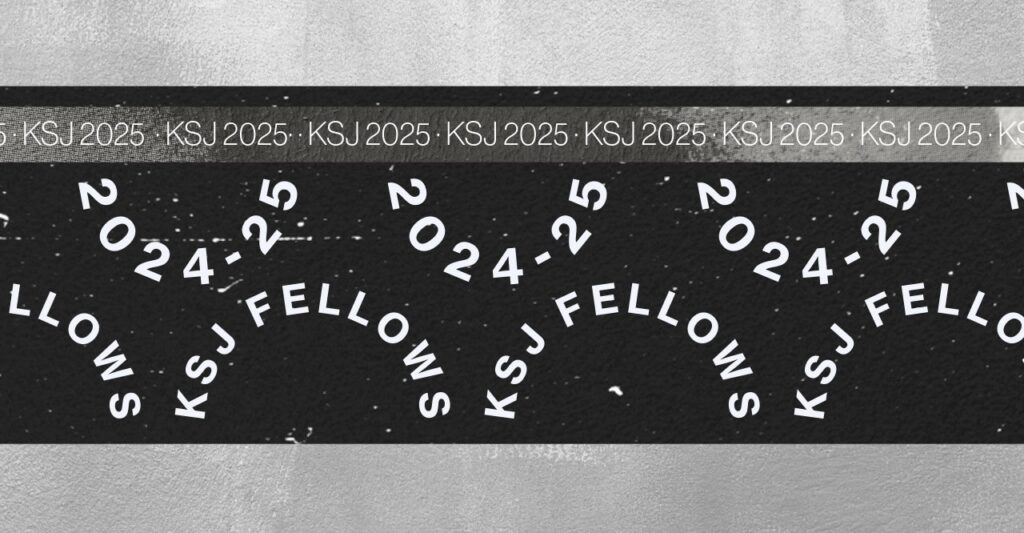The internationally renowned Knight Science Journalism Program at MIT is pleased to announce the ten esteemed science journalists who will make up its 2024-25 fellowship class. Selected from more than 180 applicants, the group comprises award-winning print, photo, and multimedia journalists hailing from around the globe.
“It’s a pleasure to bring this smart and thoughtful group of science journalists to MIT,” said Deborah Blum, Knight Science Journalism Program director. “We were impressed by their diverse backgrounds and interests, their already outstanding work in the field, and their strong sense of global community. We’re looking forward to a great year working with them..”
This fellowship class brings expansive, award-winning expertise to KSJ. Together, this group of fellows has experience with: investigative reporting, climate reporting, YouTube science script writing, documentary production, radio production, narrative fiction writing, podcasting, founding a your own news site, and reporting for an AI squad.
The fellows will spend the 2024-25 academic year in Cambridge studying at MIT and other leading research universities in the Boston area. They’ll also attend seminars by leading scientists and storytellers, take part in hands-on masterclasses and workshops, and visit world-renowned research laboratories. Each journalist will also pursue an independent research project, focused on a topic of their choice that advances science journalism in the public interest.
Now in its 41st year, the Knight Science Journalism program is supported by a generous endowment from the John S. and James L. Knight Foundation, and recognized around the world as the premier mid-career fellowship program for science writers, editors, and multimedia journalists. Since its founding, the program has hosted some 400 journalists representing media outlets from The New York Times to Le Monde, from CNN to the Australian Broadcasting Corporation.
In addition to science journalism fellowships, the program publishes the award-winning digital magazine Undark and administers a national journalism prize, the Victor K. McElheny Award. The Knight Science Journalism Program’s academic home at MIT is the Department of Science, Technology and Society, which is part of the School of Humanities Arts and Social Sciences.
The 2024-25 Knight Science Journalism Fellows:

Fabiana Cambricoli is an award-winning Brazilian journalist based in São Paulo, working as a senior health correspondent for Estadão newspaper with a focus on in-depth and investigative stories. Before that, she contributed to major media outlets like Grupo Folha and was a fellow at ProPublica. She earned her bachelor’s degree in Journalism and a master’s degree in public health from the University of São Paulo, receiving over ten awards and grants for her work. Cambricoli’s reporting uncovered government negligence during epidemics, highlighted health disparities, and investigated funding behind scientific disinformation. She also co-founded Fiquem Sabendo, a non-profit promoting transparency and supporting journalists in accessing public information.

Emily Foxhall is the climate reporter at The Texas Tribune, where she focuses on the clean energy transition and threats from climate change. She joined the Tribune in 2022 after two years at The Los Angeles Times and its community papers and seven years at The Houston Chronicle, where she covered the suburbs, Texas features, and the environment. She has won multiple Texas Managing Editors awards, including for community service journalism, and was part of the team named a 2018 finalist for the Pulitzer Prize for coverage of Hurricane Harvey. She is a Yale graduate.

Ahmad Gamal Saad-Eddin is a science journalist based in Egypt. He graduated from the faculty of medicine (Zagazig University) in Egypt, and worked as a psychiatrist before leaving medicine and beginning a career in science journalism, first as a head of the science section in Manshoor.com, then as an editor at Nature Arabic Edition. He is currently working as a script writer and the fact-checker of El-Daheeh, the leading science YouTube show in the Arab region. His writings have also appeared in several outlets including Scientific American Arabic Edition and Almanassa News. His main writing interest is the interaction between science, its history, and the human experience.

Bryce Hoye is a journalist with the Canadian Broadcasting Corporation in Winnipeg. He covers a range of topics, from courts and crime to climate, conservation, and more. His stories appear on TV, radio, and online, and he has guest-hosted CBC Manitoba’s Weekend Morning Show and Radio Noon. He has produced national documentaries for CBC Radio, including for the weekly science program Quirks & Quarks. He has won several Radio Television Digital News Association national and regional awards. He previously worked in wildlife biology monitoring birds for several field seasons with Environment and Climate Change Canada.

Jori Lewis writes narrative nonfiction that explores how people interact with their environments. Her reports and essays have been published in The Atlantic Magazine, Orion Magazine, and Emergence Magazine, among others, and she is a senior editor of Adi Magazine, a literary magazine of global politics. In 2022, she published her first book, Slaves for Peanuts: A Story of Conquest, Liberation, and a Crop That Changed History, which was supported by the prestigious Whiting Creative Nonfiction Grant and a Silvers Grant for Work in Progress. It also won a James Beard Media Award and the Harriet Tubman Prize. Photo credit: Elise Fitte Duval

Yarden Michaeli is a journalist serving as the science and climate editor of Haaretz, Israel’s sole paper of record. During his ten years as a writer, reporter, and editor at Haaretz, he became best known for editing the newspaper’s science vertical during the Covid-19 pandemic and founding its climate desk. Among other things, Yarden served as Haaretz’s first reporter on the ground during the war in Ukraine, covered the war in Gaza, and was dispatched to report on the forefront of the climate crisis during storm Daniel in Greece. Yarden was born in Israel and he is based in Tel Aviv. He has a Bachelor’s degree in American Studies and Economy from the Humboldt University in Berlin and he is a member of the Oxford Climate Journalism Network.

Tsvangirayi Mukwazhi is a two-time winner of the CNN Africa photojournalist award. He is currently with Associated Press in Zimbabwe. Previously, he was the Chief Photographer at the Associated Newspapers of Zimbabwe. With an eye for detail and a passion for multi-format storytelling, he has managed to capture the essence of humanity in his photographs across Africa, Europe, and Asia. His dedication to his craft and hard work is instilled in other photojournalists in his past teaching role with the Norwegian Friedskorp, World Press Foundation in the Netherlands, the Pathshala Institute in South-East Asia, and in his pioneering gender and images work with SAMSO across the southern and East African region.

Aaron Scott is an award-winning multimedia journalist and the creator of the podcast Timber Wars, which was the first audio work to win the MIT Knight Science Journalism Program’s Victor K. McElheny Award, along with the National Headliner Award for Best Narrative Podcast and others. Most recently, he was a host of NPR’s science podcast Short Wave. Before that, he spent several years exploring the natural wonders of the Pacific Northwest as a reporter/producer for Oregon Public Broadcasting’s television show Oregon Field Guide. His stories have appeared on NPR, Radiolab, This American Life, Outside Podcast, Reveal, and elsewhere. Photo Credit; Farrah Skeiky/NPR

Evan Urquhart is a freelance journalist whose work has focused on science and medical questions relating to the transgender community. Based in Charlottesville, VA, his stories have appeared on Slate, Politico, the Atlantic, Vanity Fair, and many other outlets nationwide. In 2022, Evan founded Assigned Media, a news site devoted to fact-checking the widespread misinformation relating to trans issues. He has appeared as an expert on propaganda and misinformation relating to trans issues on radio shows and podcasts including NPR’s St. Louis on the Air, Slate’s Outward, the American Prospect’s Left Anchor, What the Trans?, and It Could Happen Here.

Jane Zhang is a technology reporter and the China representative of Bloomberg’s global AI squad based in Hong Kong. She has over the years covered the Chinese internet and Beijing’s tensions with the US over tech supremacy before jumping feet-first into reporting China’s historical crackdown on its largest corporations including Alibaba. She has won awards for extensive on-the-ground reporting and exclusive interviews with industry heavyweights like Huawei founder Ren Zhengfei. Her current focus is on covering the incipient AI technology and the regulations around it. Zhang holds a master’s degree in journalism from the University of Hong Kong.





[…] internationally renowned Knight Science Journalism Program at MIT is pleased to announce the ten esteemed science journalists who will make up its 2024-25 fellowship […]